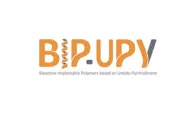Bioactive implantable polymers based on ureidopyramidinone -BIP-UPy
Bioactive Implantable Polymers based on UreidoPyrimidinone
2013-2017
FP7 MNP3-LA-2012-310389
BIP-UPy, which stands for Bioactive Implantable Polymers based on UreidoPyrimidinone, is a 4 years project co-funded by the European Commission within the Seventh Framework Programme. The project addresses the need for new biomedical implants which could be easily fine-tuned in terms of bioactivity, biodegradability and mechanical performance depending on their final clinical application.
Biomedical implants based on polymer technologies have become an indispensable part of effective modern medicine. They represent one of the more stable markets for polymers in terms of growth. According to the consultancy firm Frost & Sullivan, the total European market for polymers in medical devices (including implants) had revenues of EUR 437 million in 2008, and this is forecasted to reach EUR 664.2 million by 2015.
Bioactive BIP-UPy implants aim at improving quality of life of people suffering from intracranial aneurysms and women with pelvic organ prolapse (POP) and stress urinary incontinence (SUI). The improved functionality and optimized compatibility with the body of these new implants will lead to improved patient outcome, reduced hospitalization time; treatment-related risks, ultimately resulting in a healthcare costs reduction. BIP-UPy opens an innovative strategy for medical implants promoting a body response towards in-situ tissue-engineering and therapy.
The final goal of BIP-UPy is to develop new bioactivated polymers with specific bioactivities which can be used to provide the required properties to the targeted biomedical implants. It is envisaged that the developed biomaterials could be easily translated into other biomedical applications related to implanted devices.
Led by Fundació Privada Ascamm (Barcelona, Spain), the consortium is formed by 10 partners from five European countries balancing the active participation of 2 universities, 1 technology centre, 4 SMEs, 1 large enterprise and 2 health institutions.
Lodz University of Technology is responsible for Scientific and Technical Coordination of all actions within the Project and, among others, of sterilization (ISO 556); biocompatibility (ISO 10993); microbiology (JIS Z 2801)) issues. (www.bipupy.eu)
Contact: Radosław Wach
Dissemination
- R.A. Wach, W. Mozalewska, M. Ramos Gallego, J. Vange, A.W. Bosman, T. Mes, In vitro biodegradation of e-spun mesh based on supramolecular UPy chemistry, 10th World Biomaterials Congress, May 17-22 2016, Montreal Canada
- R.A. Wach, Importance of sterilization in development of a medical device, United Kingdom Society of Biomaterials 15th Annual Conference, 30 June – 1 July 2016, London, United Kingdom
- R.A. Wach, W. Mozalewska, A. Adamus, A.K. Olejnik, M. Ramos Gallego, J. Vange, A.W. Bosman, T. Mes, J.M. Rosiak, Sterilization of a biodegradable medical device comprising supramolecular polymers – is radiation technique appropriate?, IRaP 2016 – The 12th International Symposium of Ionizing Radiation & Polymers, 25-30 September 2016, Presqu’île de Giens, France
- R.A. Wach, W. Mozalewska, A.K. Olejnik, A. Adamus, M. Ramos Gallego, J. Vange, A. W. Bosman, T. Mes, Approach to selection of sterilization method for biodegradable polymeric medical device, 25th Biomaterials in Medicine and Veterinary Medicine Conference, 13-16 October 2016, Rytro, Poland
- W. Mozalewska, A. Adamus, M. Ramos Gallego, J. Vange, A. W. Bosman, T. Mes, R. A. Wach, Biodegradacja in vitro biomateriałów polimerowych zawierających grupy ureidopirymidynowe (In vitro biodegradation of UPy-polymeric materials), Mała-Wielka Nauka “W labiryncie nauki” (Small & Big Science ‘In the Labyrinth of Science’), 9-10 grudnia, Łódź, Poland
